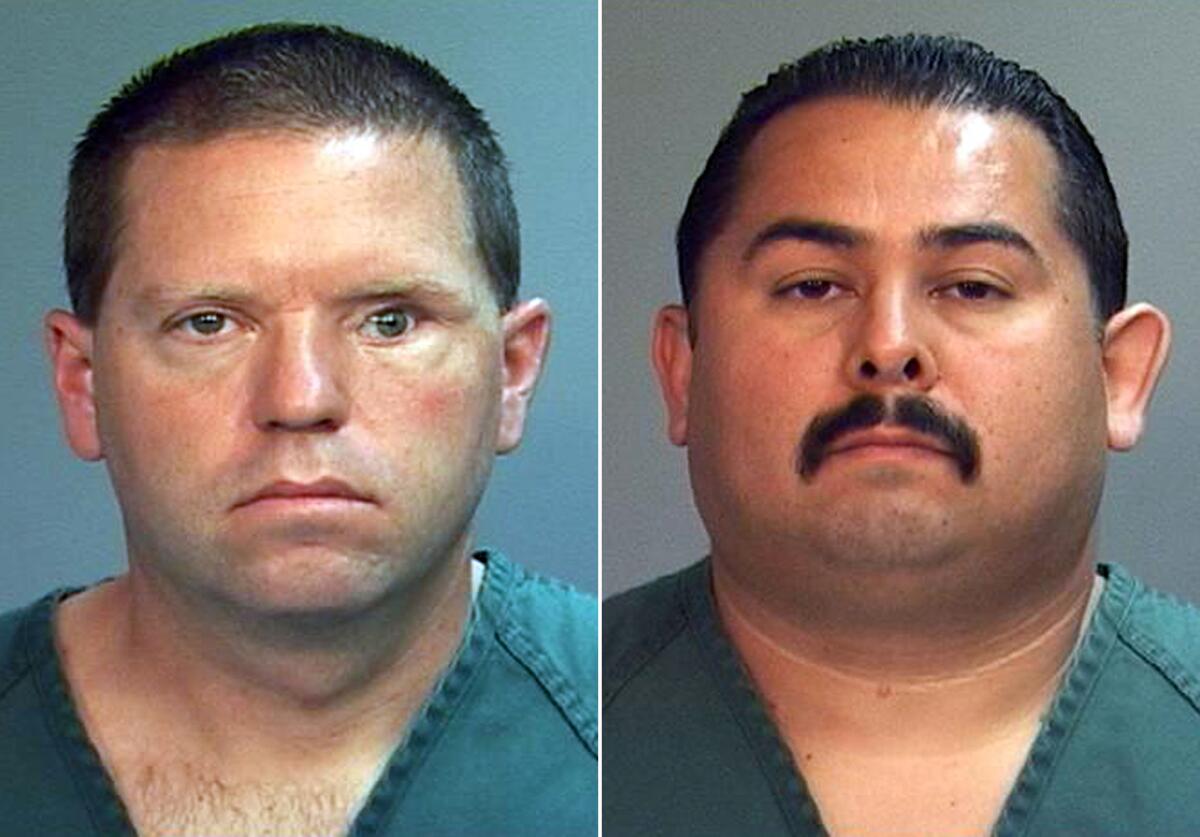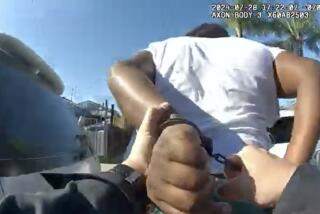Officers in Kelly Thomas beating acted within policy, trainer testifies

A use-of-force trainer testified Tuesday that the actions of two Fullerton police officers charged in the 2011 beating death of Kelly Thomas were acting within the department’s policies.
Manuel Ramos is charged with second-degree murder and involuntary manslaughter in the death. Jay Cicinelli is charged with involuntary manslaughter and excessive force.
A 33-minute video of the altercation, synced with audio from devices worn by Fullerton police that night, shows officers repeatedly striking Thomas with batons and a Taser. The video has been key to the prosecution’s case and helped propel the July 5, 2011, clash to the national spotlight.
On the witness stand, Cpl. Stephen Rubio said the Taser that Cicinelli used on Thomas wasn’t working correctly because Thomas continued to fight and the device made a noise that indicated it was being “ineffective.”
After watching segments of the video, Rubio -- who trains officers in the Fullerton department -- said Cicinelli hit Thomas three times in the head with the Taser. Officers, he said, are allowed to improvise with their weapons, though they aren’t trained to use a Taser as an impact weapon.
Strikes to the head and face can be dangerous depending on what items are used, how hard they land and where they hit the suspect, Rubio said. They’re only acceptable when there’s the threat of great bodily injury or death to an officer.
“In the video, all things considered, I don’t see anything out of policy,” Rubio said.
A former FBI agent and use-of-force expert who testified for prosecutors last week said hitting a suspect in the head with an impact weapon is considered deadly force.
“That would not be good proper police procedure,” John Wilson testified as the surveillance tape of the police encounter with Thomas was played and paused.
Thomas died five days after the struggle. A county coroner’s investigation determined that he died of brain damage from lack of oxygen caused by chest compression and injuries to the face. Defense lawyers have argued that the findings were incorrect and he died of a bad heart due to his drug use.
Defense attorneys also asked Rubio about a part in the video in which Ramos put on white latex gloves and tells Thomas, “See these fists? ... They’re getting ready to f--- you up.”
Prosecutors have identified the moment as the point at which the encounter escalated from routine to deadly.
John Barnett, who is representing Ramos, asked Rubio if his client’s words were consistent with his training.
“Yes, it was a conditional threat,” Rubio said. “The profanity may be off-color and may be a slight policy violation.”
Still the use of words, even profane ones, as a means to avoid endangering an officer or suspect is acceptable, Rubio said.
During cross-examination, Senior Assistant Deputy Atty. Jim Tanizaki repeatedly asked Rubio if Ramos was trained to calm tense situations using words when dealing with suspects, in particular with someone believed to be mentally ill.
“Sir, I trained him, once again, to communicate with people effectively,” Rubio said, “whether they’re mentally ill or not.”
The defense is expected to call its last witness Wednesday morning.
ALSO:
Big Sur wildfire grows slightly; crews hope for weather assist
Mega Millions jackpot: Long odds, but these shops have a record
2 people ID’d in deadly Huntington Beach crash that split car in two
Twitter: @AdolfoFlores3
More to Read
Sign up for Essential California
The most important California stories and recommendations in your inbox every morning.
You may occasionally receive promotional content from the Los Angeles Times.











